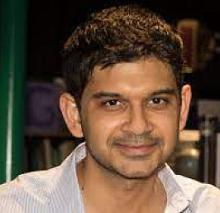A talk by Aditya Balasubramanian, Senior Lecturer in Economic History at the Australian National University, on his new book, Toward a Free Economy: Swatantra and Opposition Politics in Democratic India, a perspective on opposition and democracy from Indian history.
Event moderated by Sai Balakrishnan, Associate Professor of City and Regional Planning, in a joint appointment with DCRP and GMS (Global Metropolitan Studies)
 About the Book: Neoliberalism is routinely characterized as an antidemocratic, expert-driven project aimed at insulating markets from politics, devised in the North Atlantic and projected on the rest of the world. Revising this understanding, Toward a Free Economy shows how economic conservatism emerged and was disseminated in a postcolonial society consistent with the logic of democracy.
About the Book: Neoliberalism is routinely characterized as an antidemocratic, expert-driven project aimed at insulating markets from politics, devised in the North Atlantic and projected on the rest of the world. Revising this understanding, Toward a Free Economy shows how economic conservatism emerged and was disseminated in a postcolonial society consistent with the logic of democracy.
Twelve years after the British left India, a Swatantra (“Freedom”) Party came to life. It encouraged Indians to break with the Indian National Congress Party, which spearheaded the anticolonial nationalist movement and now dominated Indian democracy. Rejecting Congress’s heavy-industrial developmental state and the accompanying rhetoric of socialism, Swatantra promised “free economy” through its project of opposition politics.
As it circulated across various genres, “free economy” took on meanings that varied by region and language, caste and class, and won diverse advocates. These articulations, informed by but distinct from neoliberalism, came chiefly from communities in southern and western India as they embraced new forms of entrepreneurial activity. At their core, they connoted anticommunism, unfettered private economic activity, decentralized development, and the defense of private property.
Opposition politics encompassed ideas and practice. Swatantra’s leaders imagined a conservative alternative to a progressive dominant party in a two-party system. They communicated ideas and mobilized people around such issues as inflation, taxation, and property. And they made creative use of India’s institutions to bring checks and balances to the political system.
Democracy’s persistence in India is uncommon among postcolonial societies. By excavating a perspective of how Indians made and understood their own democracy and economy, Aditya Balasubramanian broadens our picture of neoliberalism, democracy, and the postcolonial world.
About the Author: Aditya Balasubramanian is a Senior Lecturer in History. His research focuses on various aspects of the history of modern South Asia. His first book, Toward a Free Economy: Swatantra and Opposition Politics in Democratic India (Princeton: Princeton University Press, 2023), is a history of economic ideas and politics (UK/US link; South Asia link). It was shortlisted for the 2023 Elder Prize in the Social Sciences of the American Institute of Indian Studies.
Aditya completed his PhD at Trinity College, Cambridge as a British Marshall Scholar and a Cambridge Trust Scholar. His dissertation won the Ellen McArthur Prize in Economic History and was shortlisted for the Prince Consort and Thirlwall Prize for best dissertation in the Faculty of History.
At ANU, Aditya teaches “From Moral Philosophy to (Political Economy) to Economics: A History,” and “Approaches to History.” He has been a Board Member of the South Asia Research Institute, an affiliate of the Center for Economic History, and a member of the Geoeconomics Working Group. Aditya also coordinates the Harvard-Cambridge Joint Center for History and Economics’ “Archives of Economic Life in South and Southeast Asia” website.
He has received grants and fellowships from the Joint Center for History and Economics at Harvard and Paris (2022), the Australian Studies Institute at ANU (2023), and the College of Arts and Social Sciences at ANU (2023).
To the print media, he has contributed in Scroll.in, Hindustan Times, and India Forum.
_________________
Follow us on TWITTER
Like us on FACEBOOK
For DIRECTIONS to the Institute please enter “Institute for South Asia Studies” in your google maps or click this GOOGLE MAPS LINK.
PARKING INFORMATION
Please note that parking is not always easily available in Berkeley. Take public transportation if possible or arrive early to secure your spot.
Event is FREE and OPEN to the public.
_________________
If you require an accommodation for effective communication (ASL interpreting/CART captioning, alternative media formats, etc.) or information about campus mobility access features in order to fully participate in this event, please contact Puneeta Kala at pkala@berkeley.edu with as much advance notice as possible and at least 7-10 days in advance of the event.

